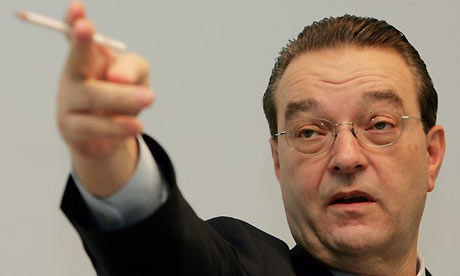
Still buffeted by the financial crisis, UBS AG's move to boost its capital base underlines its continuing struggles to return to profitability even as its competitors are minting money.
The bank raised 3.8 billion Swiss francs ($3.5 billion) late last week by placing 293 million shares, or 8.4% of its capital, with a few investment institutions. It marked the fourth time in less than two years that UBS shareholders have suffered a dilution of their holdings.
At the same time, the bank announced it would post a loss for the second quarter and said customers continued to pull money from its flagship wealth-management business.
The announcement emphasized the hill the bank's new boss, Oswald Grübel, a former top banker with rival Credit Suisse Group AG who took over in February, must still climb to turn around the bank.
Many of UBS's high-net-worth customers have been scared off by the bank's dispute with the U.S. Internal Revenue Service, which wants it to hand over details of 52,000 accounts. A civil trial over that demand is scheduled to start July 13 in a federal court in Miami unless a settlement is reached.
The share placement appears to have been pressed upon the bank by the Swiss authorities, concerned about further deterioration in borrower creditworthiness in the face of recession, analysts said.
The Swiss government "wants to see higher capital levels so that banks can absorb losses because Switzerland would struggle to do so," said David Williams, an analyst at Fox-Pitt Kelton. Swiss bank assets are equal to more than six times Swiss gross domestic product.
UBS took pains to highlight that it isn't raising capital due to one isolated, negative event, but instead to "take advantage of current market opportunities."
The bank raised 3.8 billion Swiss francs ($3.5 billion) late last week by placing 293 million shares, or 8.4% of its capital, with a few investment institutions. It marked the fourth time in less than two years that UBS shareholders have suffered a dilution of their holdings.
At the same time, the bank announced it would post a loss for the second quarter and said customers continued to pull money from its flagship wealth-management business.
The announcement emphasized the hill the bank's new boss, Oswald Grübel, a former top banker with rival Credit Suisse Group AG who took over in February, must still climb to turn around the bank.
Many of UBS's high-net-worth customers have been scared off by the bank's dispute with the U.S. Internal Revenue Service, which wants it to hand over details of 52,000 accounts. A civil trial over that demand is scheduled to start July 13 in a federal court in Miami unless a settlement is reached.
The share placement appears to have been pressed upon the bank by the Swiss authorities, concerned about further deterioration in borrower creditworthiness in the face of recession, analysts said.
The Swiss government "wants to see higher capital levels so that banks can absorb losses because Switzerland would struggle to do so," said David Williams, an analyst at Fox-Pitt Kelton. Swiss bank assets are equal to more than six times Swiss gross domestic product.
UBS took pains to highlight that it isn't raising capital due to one isolated, negative event, but instead to "take advantage of current market opportunities."




